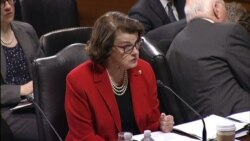One day after Donald Trump fired his acting attorney general for refusing to back a contentious immigration order, Senate Democrats on Tuesday protested the president’s actions by delaying a committee vote to advance Trump’s nominee for the same post, Republican Senator Jeff Sessions of Alabama.
“The American people need answers on exec orders from Sen Sessions,” wrote Senate Minority Leader Chuck Schumer, a New York Democrat, on Twitter. “Jud Cmte shouldn’t proceed until we get them so I'll invoke the 2hr rule.”
Rarely used, the two-hour rule bars committees from meeting for more than two hours after the full Senate has gaveled in on any given day. Republicans wielded it on occasion years ago to slow the approval of former President Barack Obama’s nominees.
Not every senator on the Judiciary Committee had a chance to speak Tuesday before the time limit was reached.
“We’ll meet again tomorrow and we’ll immediately have a vote,” announced Chairman Chuck Grassley, an Iowa Republican.
At the White House, spokesman Sean Spicer blasted delayed committee votes as “outrageous.”
The Judiciary Committee had been expected to narrowly approve Sessions, with all Republicans backing and all Democrats opposing their fellow lawmaker, an early Trump supporter who has been the Senate’s most outspoken advocate of restricting U.S.-bound migration.
“Senator Sessions has assured us that he will faithfully enforce the laws fully, fairly, and independently,” Grassley said. “His life of public service and his experience working with each of us [as senator] assures me that Senator Sessions will make an outstanding attorney general.”
Democrats continued to seethe over Trump’s executive order on refugees and arrivals from seven majority-Muslim nations, as well as his dismissal of acting attorney general Sally Yates, late Monday evening. While applauding Yates for standing up to the president, Democrats expressed grave doubts that Sessions would do the same as America’s top law enforcement officer.
“He was the first senator to endorse [Trump]. He attended at least 45 Trump campaign events,” said Senator Dianne Feinstein of California, the committee’s top Democrat. “It is very difficult to reconcile, for me, the independence and objectivity necessary for the position of attorney general with the partisanship this nominee has demonstrated.”
WATCH: Feinstein on lack of confidence in Sessions
“The attorney general is the people’s attorney, not the president’s attorney,” said Democratic Senator Patrick Leahy of Vermont. “Ms. Yates’ willingness to defend the rule of law, instead of defending President Trump’s political whims, demonstrates exactly why having an independent attorney general is so important and why we have to be so careful in selecting our next attorney general.”
Republicans came to Sessions’ defense, including Lindsey Graham of South Carolina, who has publicly opposed Trump’s executive order.
"Jeff Sessions is not the first person to be close to a president, who advised a president, and who wound up being in the president’s Cabinet," Graham said. "The fact that he’s close to the president doesn’t disqualify him at all. It makes perfect sense."
Another Republican, John Cornyn of Texas, disputed any portrayal of Yates as heroic for refusing to back Trump’s executive order.
“Her choice was to do her job [as acting attorney general] or resign,” Cornyn said.
Democrats had asked for an additional opportunity to question Sessions in committee and probe his views on the president’s executive order. Republicans declined, noting that Democrats had already delayed a committee vote by one week.
If approved in committee, the Sessions nomination would go before the full Senate for a final vote, likely next week. Confirmation is assured so long as majority Republicans remain united behind him.
Sessions was first elected to the Senate in 1996. He has also served as attorney general in his home state of Alabama and a federal prosecutor. Former president Ronald Reagan nominated Sessions to be a federal judge in 1986, but the Senate rejected him for the post amid strong opposition from civil rights groups and allegations that he had made racially offensive remarks in his past.












